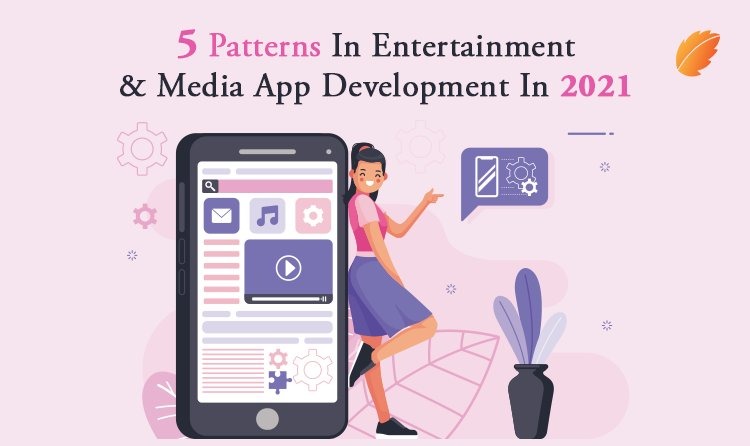5 Patterns In Entertainment & Media App Development In 2021
Although media and entertainment app development solutions have been proactive in setting themselves up for the upcoming digitized shifts since days of yore, the pandemic's beginning has reaffirmed its confidence towards change.

Current-day consumers, reacting to the new reality with excitement, convince the entertainment app development market players to offer them new packages and conditions and D2C models with everything-you-can-eat access to digital content, including music and recordings and games.
Even with the new reality, existing business sector players or content suppliers, for example, every OTT app development company to fulfill the clients' existential needs, figured out how to flourish. In any case, others confronting strong headwinds are realigning themselves to speed up their digitization plans by searching for dependable media and entertainment app development solutions.
Let's not make you wait any longer for the top 5 patterns in entertainment and media app development in 2021.
1. Direct-to-Consumer (D2C) Video Streaming
The beginning of the lockdowns forced across topographies prompted a spike for internet providers, with individuals accessing web-based compelling and excellent video content. Therefore, the US pay-TV membership experienced a jolt, attributable to the cross-stage compatibility presented by OTT platforms like Netflix and Amazon Prime.
Every OTT app development company needs to revamp content and proposition different configurations like recordings, music, and gaming on a solitary aggregated base. Content providers need to shape strong associations and proposition content dependent on a joint revenue model. Content disintegration is a significant disappointment for OTT consumers as it makes content disclosure troublesome and prompts application clog on the clients' gadgets.
2. Banking On Personalized Content
Presently, in entertainment app development solutions, client relationship management is crucial for holding subscribers to their seats. Millennials and Generation Z preferably choose streaming services that offer them content customized as they would like. Every OTT platform utilizes Artificial Intelligence and Machine Learning solutions to give content suggestions on client behavior and demographic information.
Understanding the crowd and serving relevant content has become a critical differentiator for an OTT platform's prosperity. While the principal stage in the OTT app development saw an expanding market exposure with reasonable data plans and cell phones, the coming stage will see the development of AI/ML-based customized suggestion engines. Personalization chips away at every one of the four elements of a media and entertainment app, in a particular Content, User Interface (UI), User Experience (UX), and assistance to defeat difficulties, for example,
• High Customer Acquisition Cost (CAC)
• Making important OTT content discoverable
• Increasing average client content utilization
• Converting freemium clients into paid media users
• Retaining the subscriber base
3. Advertisement Based Business Models
What at first drew the crowds towards media and entertainment app was that they could watch content on-demand without enduring promotions, an experience that customary TV neglected to offer. However, with top studios and worldwide media aggregates foraying into the media streaming space, promotional content remains the primary choice to accomplish financial suitability.
Streaming advertisement-based content is a method for keeping the membership expenses competitive. From the promoters' stance, OTT is an attractive option providing them with the most brilliant possible solution – the commitment of customary TV with accuracy and digital publicizing. A review by Freewheel Television has discovered that OTT holds a definite promoting advantage as OTT supporters complete 98% of all video advertisements.
4. Ecosystem-Based Business Models
Media and entertainment app development solutions keep taking on ecosystem-based business models depending on business settings, capacities, and procedures. The models functional across the media and media outlets are:
• Smart Content Providers
M&E organizations falling under this classification are internally centered and bridle various aspects to expand business results. Savvy content suppliers influence cutting-edge innovations such as AI and ML and normalized APIs to offer packaged content as significant contributions. E.g., New York Times and Reuters.
• Value Aggregators
These aggregators hope to hold their current client base while simultaneously focusing on a more extensive client base by offering separated administrations in a light-footed way. The entertainment app development solutions offer hyper-personalization by tackling the abilities of outsider substances through APIs. E.g., Netflix.
• Value Creators
They manufacture cross-industry networking and commercial collaborations. Google and Amazon are value creators that give software-driven platforms that other environment players can use.
5. New Technologies to Drive Innovation in the Mobile & Entertainment Industry
New advances and IT frameworks will empower the OTT app development company to develop novel plans of action. In combination with buyers' status to embrace digital media encounters, advances will open up better approaches to rethink and present professional and quicker expansion opportunities.
Let's look at some of the following:
AR/VR: Although AR/VR advances have seen much enthusiasm, their reception has slacked. But, with most cell phone models supporting AR/VR content, their long-proclaimed potential will be understood. Pandemic has pushed forth 360-degree experiences with settings like film theaters and sports arenas shut or limited.
5G Network: According to GSMA Intelligence, by 2025, 45% of the world will be covered by 5G, interfacing over 1.7 billion gadgets, prompting the expansion in the number of immediate purchasers utilizing high-velocity mobile data to get to the video, sound, and gaming content.
Artificial Intelligence: Artificial Intelligence (AI) quickly makes its quality felt in homes, with many individuals communicating with advanced aides. As indicated by the Outlook survey, by 2024, there will be more than 540 million intelligent speakers across 20 nations, chiefly in the Asia-Pacific area. Another important use of AI in entertainment and media app development is hyper-personalization in conveying content.
Final Words-
Consagous Technologies is a leading mobile application development company with proficiency in media and entertainment app development solutions that provides successful outcomes to give your business a competitive edge profitably. Reach now to gain valuable insights.
Original Source:
https://www.consagous.co/blog/5-patterns-in-entertainment-media-app-development-in-2021
Comments
Post a Comment